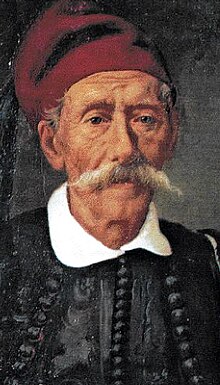| This article does not cite any sources. Please help improve this article by adding citations to reliable sources. Unsourced material may be challenged and removed. Find sources: "Kanellos Deligiannis" – news · newspapers · books · scholar · JSTOR (February 2022) (Learn how and when to remove this message) |
| Kanellos Deligiannis | |
|---|---|
| Κανέλλος Δεληγιάννης | |
 A portrait of Deligiannis A portrait of Deligiannis | |
| Speaker of the Hellenic Parliament | |
| In office 1844–1845 | |
| Monarch | Otto |
| Personal details | |
| Born | c. 1780 Langadia, Morea Eyalet, Ottoman Empire (now Greece) |
| Died | 18 September 1862 Athens, Kingdom of Greece |
| Military service | |
| Allegiance | |
| Branch/service | |
| Battles/wars | |
Kanellos Deligiannis (Greek: Κανέλλος Δεληγιάννης; c. 1780–1862) was a Greek magnate from the Morea and the son of Ioannis Deligiannis. He was one of the main organizers of the Greek War of Independence and a politician in the independent Kingdom of Greece.
Biography
He was born in Langadia, Gortynia, and was a son of one of the most important magnates in the Peloponnese (Morea), Ioannis Deligiannis. Due to the prominence of his family [el; fr] in the area, he played an important role in the Greek Revolution.
He fought at Tripolitsa, Peta, Missolonghi,and elsewhere. During the Greek civil wars of 1824–1825, he joined with many chiefs of the Peloponnese and Hydra and convinced Theodoros Kolokotronis to join them by offering his daughter in marriage to one of Kolokotronis' sons. In the second round of the civil war, he was imprisoned along with Kolokotronis by the provisional government of Georgios Kountouriotis. After Independence, he became a speaker of the Greek Parliament in 1844–1845.
Deligiannis also wrote memoirs, which are considered controversial, as they seek to justify his father's pro-Turkish stance as being beneficial for the Greek population. His memoirs also portray the rivalries of the various groups and the leading families of the Peloponnese before and during the Revolution.
He died in 1862.
Categories: